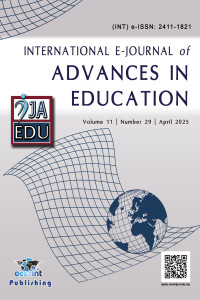INTEGRATING ARTIFICIAL INTELLIGENCE IN ACADEMIC WRITING AND RESEARCH METHODS COURSES FOR MASTER STUDENTS: A TEACHING MODEL FOR RESPONSIBLE USE
Abstract
The rapid development and adoption of artificial intelligence (AI) tools such as ChatGPT have significantly impacted academic environments, particularly at the graduate level. These tools offer valuable support in improving writing, generating ideas, and accelerating research processes. However, alongside these advantages come concerns about academic integrity and the potential for students to misuse AI by submitting AI-generated content as their own. This behavior bypasses the critical thinking and independent learning that is central to higher education. As AI becomes increasingly integrated into educational settings, it is essential to develop strategies that enable students to use AI tools responsibly, without compromising the integrity of their work.
This paper proposes a teaching model for integrating AI into Academic Writing and Research Methods courses for master students, focusing on responsible use that encourages student autonomy and academic honesty. The model aims to balance the educational benefits of AI with the necessity of developing essential skills in research, writing, and critical thinking. Rather than allowing AI to replace student effort, the goal is to use it as a tool that supports learning while maintaining the intellectual ownership of students over their work.
One of the core aspects of the proposed model is redefining the role of AI in student learning. AI can be particularly useful in the initial stages of the writing and research process.
Another key element of the model is the development of AI literacy among students. As AI technology continues to evolve, students need the skills to critically assess AI-generated content. AI tools are not infallible—they can sometimes provide inaccurate, biased, or overly general responses. In Research Methods courses, students can be tasked with using AI to generate research questions or summaries, but these outputs must be critically examined and verified against high-quality academic sources.
The importance of university libraries cannot be overstated in this model. AI tools, while efficient, cannot replace the depth and reliability of academic resources that are available through university libraries. The model emphasizes that AI should be used in conjunction with library resources, not as a substitute.
In addition to using AI and library resources responsibly, the model advocates for reflective learning. Students should be encouraged to document their use of AI and library resources throughout the assignment process. This documentation can take the form of a process log or reflective essay, where students describe how they used AI, how it influenced their work, and how they ensured the integrity of their research.
In conclusion, integrating AI into graduate-level courses on Academic Writing and Research Methods offers significant educational opportunities, but it must be done with care. The proposed teaching model provides a structured approach to using AI in ways that benefit students' learning without compromising academic integrity. By fostering AI literacy, promoting the responsible use of technology, and integrating university library resources, this model ensures that students not only benefit from AI tools but also maintain the academic standards essential to higher education.
Keywords
Artificial Intelligence Academic Integrity AI Literacy Academic Writing Research Methods University Libraries Higher Education
References
- Bender, E. M., & Gebru, T. (2021). On the dangers of stochastic parrots: Can language models be too big? Proceedings of the 2021 ACM Conference on Fairness, Accountability, and Transparency, 610–623. https://doi.org/10.1145/3442188.3445922
- Holmes, W. (2020). Artificial intelligence in education. Oxford University Press.
- Holmes, W., & Porayska-Pomsta, K. (2020). Artificial intelligence in education: Promises and implications for teaching and learning. Routledge.
- Huang, C. (2021). AI and education: Possibilities and challenges. Journal of Educational Technology, 28(4), 12–25. https://doi.org/10.1080/10494820.2021.1941268
- Huang, W. (2021). Ethical considerations in AI-assisted research and writing. Ethics and Education, 16(3), 305–321. https://doi.org/10.1080/17449642.2021.1914761
- Luckin, R. (2018). Machine learning and human intelligence: The future of education for the 21st century. Routledge.
- Luckin, R., Holmes, W., Griffiths, M., & Forcier, L. B. (2018). Intelligence unleashed: An argument for AI in education. Pearson. McKnight, P., & Allen, T. (2022). AI applications in academic writing and communication. Journal of Educational Technology, 19(2), 112–130. https://doi.org/10.1080/21532974.2022.2030221
- McKnight, P., Hobson, S., & Freeman, R. (2022). Writing with AI: Enhancing academic success through AI tools. Educational Review, 74(3), 1–15. https://doi.org/10.1080/00131911.2021.1902069
- Mollick, E. (2023). The AI classroom: Transforming learning through artificial intelligence. Springer.
- Mollick, E. (2023). Using AI tools to improve writing and research skills. Educational Review, 75(4), 541–556. https://doi.org/10.1080/00131911.2023.1895785
- Selwyn, N. (2019). Should robots replace teachers? AI and the future of education. MIT Press.
Details
| Primary Language | English |
|---|---|
| Subjects | Communication Education |
| Journal Section | Articles |
| Authors | |
| Early Pub Date | April 29, 2025 |
| Publication Date | April 30, 2025 |
| Submission Date | February 18, 2025 |
| Acceptance Date | February 27, 2025 |
| Published in Issue | Year 2025Volume: 11 Issue: 29 |
Published and Sponsored by OCERINT International © 2015 - 2025
Contact: ijaedujournal@hotmail.com
International E-Journal of Advances in Education by IJAEDU is licensed under a Creative Commons Attribution-NonCommercial 4.0 International License. Permissions beyond the scope of this license may be available at http://ijaedu.ocerintjournals.org



